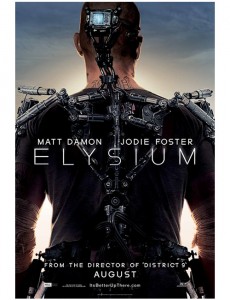“Elysium” Review by Lauren Cates
August 19, 2013 9:21 am | Leave your thoughts
Elysium.
In which Neill Blomkamp deals with the immigration problem.
Or, Sharlto Copley gives everyone the finger.
Or, William Fitchner hacks shit with assembly language.
I’m typically willing to give non-American directors, particularly the kind who have no interest in pandering to American audiences, an eager shot, simply because they tend to make movies that “feel” like things I haven’t seen a hundred times before, even if the story is well-worn. They tend to bring stuff to the table, maybe a cultural bent or atmosphere, that an American studio is less likely to give a green light to, or in the case of science fiction, try and give it a necessary weight and subtext.
Stuff like Attack the Block, Pacific Rim (and in fact, anything by Guillermo del Toro), and the deservedly distinguished nominee for a Best Picture Oscar in its release year, District 9 have made my “need to see” list in the past few years and I can’t tell you I’ve been markedly disappointed by any one of those movies.
As a side note, I normally couldn’t be bothered to see a movie like the upcoming Gravity, but because it’s directed by another of the above-mentioned non-American directors (Alfonso Cuaron, for those who don’t feel like activating the Googles). Call me a cultural snob, but I saw the second trailer for Gravity before Elysium, which is almost kind of a “sequel” to the first one. I’m not sure the premise holds up for a long-form movie, but that kind of “but wait, there’s more suspense, and we’re not even done with the movie’s central premise yet” take balls to shove out there like that.
District 9 was a particular winner for me because it was a sci-fi movie that dared to be about something deeper and less anvilicous than its main competitor that year, Avatar. Neill Blomkamp, the director, decided that in addition to action, world-building was key to making a realistic society where aliens were held in concentration camps, going so far as to create a segment of society that developed folklore around them. Those kind of details would probably be included in the novel version, but cut from the wide release, had this story the normal trajectory of an American movie.
But that’s the thing, Blomkamp is capable of telling a rich story, not because of the whiz-bang gadgets he employs (as so often, they aren’t so much nods to the audience – something that irks the ever-loving fuck out of me, by the way – as they are organic parts of the landscape), though his attention to detail is quite impressive (though, computer programming/brain hacking using assembly language? Really? Just…really?), though that’s certainly part of it: the amount of blood on Max’s (Matt Damon’s) shirt just after he is fitted for the exoskeleton, the body art/modifications on people, various tools and weapons used by the characters, all that sort of thing all contribute to a real feeling on a visceral level, and you have to hand it to the actors that make all of this stuff work.
(As an aside: Matt Damon gets a hesitant nod from me, but only because he’s a little too Jason Bourne when the situation calls for it. The exoskeleton is supposed to make him strong; nobody ever says it’s supposed to turn him into a super-soldier, and his background paints him more as a low-level criminal and not even known for fighting, so where the fuck did the fighting skill come from? And for a guy desperate to buy a really, really expensive ticket, you’d think he wouldn’t have blown a lot of money on as many tattoos as he has.)
(Also, spoiler: the data that Max is carrying is supposed to kill him when it gets transferred out. But since John Carlyle had it first before it was transferred to Max, was he expecting to die anyway? Then why would he care if Delacourt was offering him 200 years’ worth of work? Spider even tells Max he can’t come back from the transfer, so what was Carlyle’s end game, then?)
But more than that is how much of the way he tells his story tends to rely on the fact that the premise never feels like a ridiculous problem. Many is a time when I’m watching a movie where, say, Xander Cage is stopping Ice99 from destroying the world with a deadly weapon, where I don’t give a fuck, precisely because not only is the ending a foregone conclusion, but also because that story exists in a world where nobody would tell you any of it actually happened, and you probably wouldn’t be likely to believe it if they did: it’s a story about rich people, high-tech toys, and government clearances. Big whoop-de-shit.
On the other hand, immigration is a very real problem and it does reflect very real attitudes (blundered slightly in this year’s The Purge), without turning the Jodie Foster character into a cartoonish Nazi she-wolf, or any Earth dwellers into sad cultural stereotypes.
It’s about time this summer that someone made a decent action movie that gave a good reason for all the bloodshed.
Tupperware
Review by Lauren Cates
Tags: District 9, Elysium, Elysium movie, Jodie Foster, Matt Damon, Neill Blomkamp, Sharlto Copley, William Fichtner
Categorised in: Movie Reviews
This post was written by David Griffin






Leave a Reply